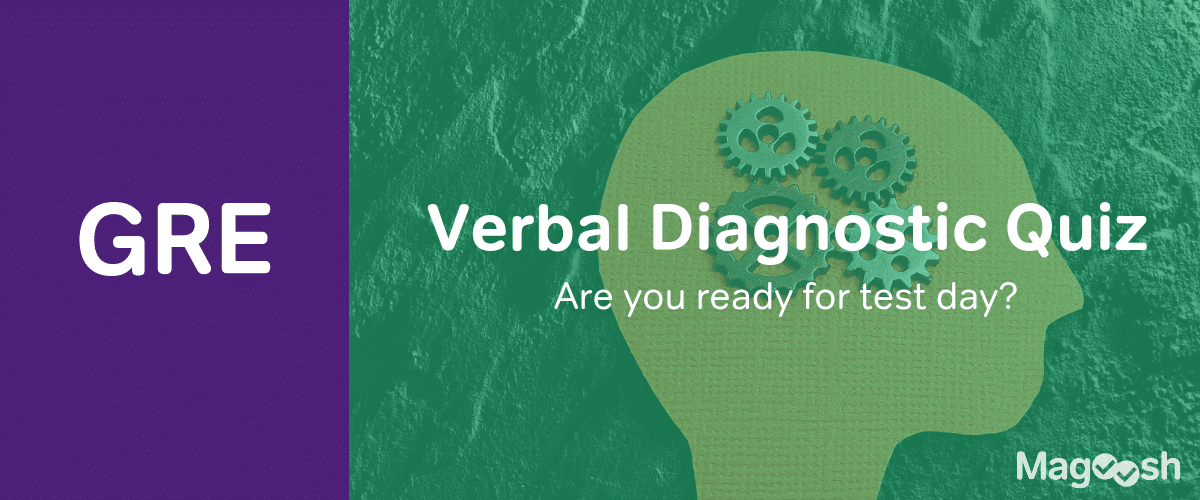
[threecol_two]
GRE Verbal Reasoning
The GRE Verbal section is an incredibly challenging test of English grammar, reading comprehension, critical reading, and—most difficult of all—vocabulary! So how do you study for such an intense exam? To start, you’ll need to understand the format of the GRE Verbal section, know the question types you’ll see on test day, and get lots of GRE Verbal practice.
GRE Verbal Basics
The GRE Verbal section doesn’t actually have a spoken verbal component. You’ll be reading passages, analyzing grammatical relationships, and answering multiple choice questions.
When preparing for this section, divide your GRE Verbal practice into three sections based on the main question types:
-
1. Reading Comprehension
2. Text Completion
3. Sentence Equivalence
[/threecol_two]
[threecol_one_last]
[/threecol_one_last]
1. Reading Comprehension
This section of the GRE exam tests your ability to perform the type of active reading and analysis that you’ll be required to do in graduate school. In your GRE verbal review, work on recognizing challenging vocabulary and understanding the grammatical elements at work in each text. This will help you fully comprehend the meaning of each passage.
Reading comprehension questions are based on GRE passages that are one or more paragraphs long. The GRE Verbal test contains about 10 passages in total, most of which are short (only one paragraph long). These passages are drawn from various sources: physical sciences, biological sciences, social sciences, business, arts, humanities, etc. Some are academic and some are nonacademic. You never know what you’re going to get.
Rather than passively reading each passage, you’ll be required to engage with the writing—asking questions, formulating and contradicting your own hypotheses, and understanding the relationships between passages. About half of the reading comprehension questions will be based on the passages provided.
Though all reading comprehension questions are multiple choice, some will require you to select multiple correct answers, rather than just one answer. So, yeah—that provides an added challenge!
2. Text Completion
You know how your brain can read scrambled words (within reason) as long as the first and last letters are correct? (Ex: If You Can Raed Tihs, You Msut Be Raelly Smrat) Well, if you’re a very strong and analytical reader, you do a similar thing as you read long passages. As you read, you are constantly interpreting and reinterpreting the information based on the new information that’s presented farther down the passage.
The GRE’s Text Completion questions test your ability to re-evaluate passages. They do so by omitting key information from a sentence and asking you to use the rest of the passage to fill in the blank.
Here’s how these questions go. You’ll get a passage that’s 1-5 sentences long, with 1-3 blanks. You’ll get three answer choices for each blank (or 5 if it’s a single blank passage), and will have to choose the one correct answer to fill in the blank.
The key here is to make sure that your answer choices make the passage coherent. The other trick? Have an excellent vocabulary and knowledge of grammar!
3. Sentence Equivalence
Did I just mention that vocabulary is important? Because this is where it becomes vital. The Sentence Equivalence questions that you’ll see on the GRE are similar to the Text Completion questions, in that you will be required to fill in a blank. However, the structure of these questions is a bit different.
Each Sentence Equivalence question is a single sentence with one blank. There are six answer choices, and your task is to select the two answer choices that could complete the sentence coherently. The two right answers may not mean the same thing. This section is like a puzzle that requires a lot of practice.
4. Vocabulary
Okay, so technically it’s not a question type on the GRE. But it might as well be! Understanding GRE vocab is hugely important when it comes to answering almost all of these question types correctly. Even when it’s not directly tested, it comes into play indirectly—in reading passages, for example.
The key? Start fine-tuning your GRE vocabulary by reading as much as you can. As you read, consider different meanings various terms can have. Studying words on their own has its place, but you’ll retain them better—and get good practice for the GRE while you’re at it—if you learn them in context.
Not sure where to start on your GRE vocabulary learning journey? To help you out, we’ve created this quiz! Just answer a few questions about your vocab level, and we’ll recommend the right FREE GRE vocabulary flashcard set for you!
GRE Verbal Practice
Just learning about the GRE Verbal section’s three question types should have made it clear to you that this section will require a lot of preparation. But where can you find solid GRE verbal reasoning practice?
If you’re looking for a great place to start your GRE Verbal practice, you can get an overview of GRE Verbal with our Ultimate Guide to GRE Verbal Reasoning.
This Ultimate Guide will help you get a feel for the structure and nuance of the Verbal Section. You’ll learn how many sub-sections you’ll be facing, what types of questions you’ll be asked (in more detail than above), and how long you have to answer each one. You’ll also get an overview of GRE-specific strategies to help you decode each part of the exam.
Taking a practice test (with or without analytical writing) as soon as you can—and then following up with other mock tests on a regular basis—is incredibly valuable as you figure out where you are right now and how to focus your practice on the skills that need the most work. If you don’t have time to take a practice test, try Magoosh’s verbal diagnostic to get a sense of your current preparedness. As you answer questions and review answer choices and correct answers, be sure to read the instructions for each question. That way, you’ll be able to skip them on test day.
Spend time reviewing your practice tests. The GRE tests skills in various formats, and with different types of questions: as I mentioned before, on this section of the GRE that includes reading passages and reading comprehension questions, text completion questions (complete the sentence), and sentence equivalence questions. Some of the question types in the GRE Verbal Reasoning section—particularly text completion and sentence equivalence—will be less familiar to you than others. Use these practice questions to learn about the format so you can boost your GRE scores and get into the graduate schools of your dreams.
(And if you’re craving even more strategies, don’t worry—Magoosh has plenty of tips for how to study for GRE verbal!)
GRE Verbal Prep Resources
As you work on your GRE verbal section practice, visit a wide variety of resources to help prep you for all aspects of this test. Here are some great ones to get you started!
Vocabulary
Study Planning
Preparing for GRE Verbal
Getting ready to take the GRE Verbal section can seem intimidating. However, by breaking down both what you need to know (content) and how the exam tests this knowledge (form)—and then preparing for both—you’ll set yourself up for success on test day.
That’s why, the more that you can work on practice tests and GRE practice questions that mirror the actual test, the better off you’ll be. Good luck in your preparation!






Leave a Reply